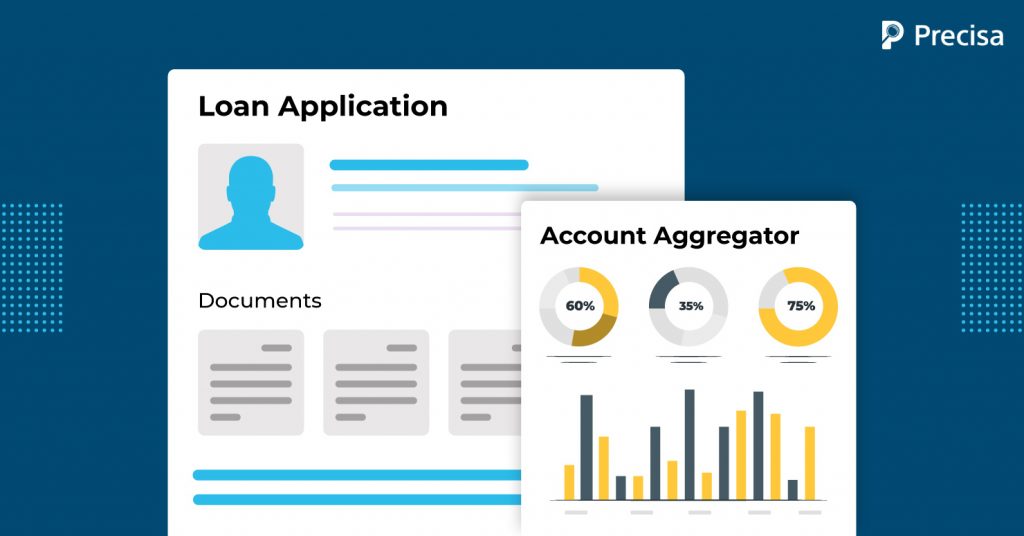All About RBI’s Account Aggregator Framework and Its Potential Impact

One of the biggest challenges consumers and providers of financial services face is the lack of a seamless, secure mechanism to access and transfer financial data.
For instance, when borrowers apply for business loans on lending apps, they need to share a host of information to establish their creditworthiness. The borrower will need to consolidate the data.
However, several things can go wrong in this process. They may take an extended amount of time to collate all the data. The data might be insufficient, repetitive, and filled with gaps. The process could become time-consuming, resulting in a longer turnaround time for processing loans.
The launch of the Reserve Bank of India’s Account Aggregator framework aims to address data-sharing challenges and streamline the credit risk assessment process of fintech.
In this blog, we delve into the various challenges and how the Account Aggregator framework bridges the gaps.
Why Are Account Aggregators Needed in the First Place?

The fintech industry currently faces a number of challenges, as follows:
1. Rapid Access to data
Consumers cannot readily access all their financial data in one place. Hence, they tend to take a significant amount of time to collate and share critical financial data, which plays a role in credit risk assessment.
2. Rejected Applications
The financial data shared by consumers may have several gaps making it insufficient for the loan applicant to qualify for credit and other financial services, increasing the number of rejected applications.
3. Absence of Credit History
Many consumers do not have a credit history, thus leaving them outside the loan ecosystem. Fintechs are aiming to resolve this issue and offer inclusive services.
These challenges increase the turnaround time to process loans, thus resulting in consumer drop-offs and loss of potential business for fintech.
Today, consumer expectations have grown, and there is a need for innovative tech-enabled products to deliver convenience, security, and speed to their experiences. This is where account aggregators can bridge the gaps.
What Exactly Is an Account Aggregator?
The account aggregator concept was introduced in India by the RBI in September 2021. Also referred to as financial data aggregation, it comprises a digital mechanism by which consumers of financial services can seamlessly share relevant financial information with providers of financial services.
The spectrum of data ranges from credit rating agencies’ assets, such as loans and credit cards, and data related to investments and cash flow through sources such as deposits, tax returns, investments, and invoices, to name a few.
Financial Information Users (FIUs) such as insurance companies, digital lenders, and banks require access to relevant financial data before offering credit and other services.
Account Aggregators: A Brief Overview
Here is a snapshot of the system:
- An account aggregator is a non-banking financial company that retrieves or collects information related to a consumer’s financial assets from a Financial Information Provider (FIP) such as their bank or NBFC.
- Only RBI-designated account aggregators with an AA license are allowed to offer this service.
- The FIP has access to their financial data, which is organized and transferred to their service provider of choice, which is considered the FIU.
- Individual consumers of financial services or MSMEs can leverage the services of an account aggregator by registering with them.
Today, several public and private banks have joined the framework to enable accessible data sharing with a consumer’s chosen account aggregator.
As of August 2022, 12 public sector banks joined the ecosystem, and 0.97 million bank accounts were linked. As of December 2022, 94 companies were registered as FIUs on the account aggregator framework.
4 Key Aspects of the Account Aggregator Framework
Here are some significant features of the account aggregator framework:
1. Data encryption
Privacy and security of the data are top priorities of the framework. To ensure this, account aggregators are not allowed to store, process and market the customer’s data. The transmitted data is encrypted to ensure its safety.
2. Spectrum of FIPs
As of now, FIPs can include Banks, NBFCs, mutual fund depositories, pension fund repositories, and insurance repositories.
3. FIUs can also be FIPs
Some entities, such as banks, can register as FIPs and FIUs. For example, a private sector bank may be registered as a FIP because it hosts many bank accounts. However, offering loans may also register as an FIU to access financial data from other sources.
4. Customers’ consent is pivotal
The consumers’ consent is a crucial aspect of the framework’s foundation. No data can be transferred without consumers’ permission, and they have complete control over what information, how much, and when it will be shared.
Growth Opportunities for Account Aggregators
The usage of RBI-designated account aggregators is expected to grow in the future.
More and more consumers will leverage this tool to securely store and share their financial information, with their permission, as and when they require access to critical financial services.
Individual consumers and business owners of micro, small, and medium enterprises are especially expected to benefit from this ecosystem because of its accessibility, cost-effectiveness, and timely sharing of critical data.
This is also a golden opportunity for businesses looking to specialise as Account Aggregators and deliver this service to consumers, FIPs, and FIUs.
Key Takeaways
The usage of account aggregators reduces the manual labour and security issues involved in sharing sensitive, comprehensive data that has the potential to impact the financial access and operating cycles of businesses.
With access to enough relevant data, fintech platforms can easily analyse financial statements and process risk assessments and loans quickly and accurately. The potential impact is that fintechs can expedite their services and play a key role in triggering economic activity in India.
Cloud-based fintech analytics platform Presica’s user-friendly bank statement analyzer aims to simplify the analysis process through automation, which enables the results to be delivered in minutes.
Precisa also provides actionable insights on an easy-to-use dashboard, helping businesses make informed lending decisions.
Request a free demo today!
